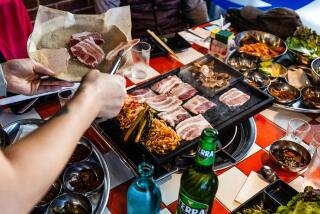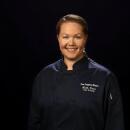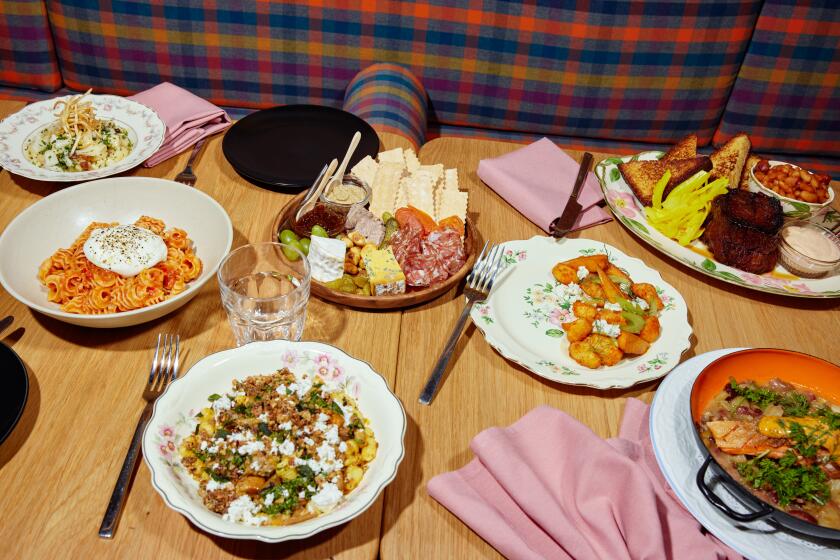Q&A: Q&A: Kitchen talk with Sylvie Curry of ‘Lady of Q’
- Share via
Think you’ve got winning barbecue? It’s one thing to be a weekend warrior at a summer cookout, but it’s another thing entirely to enter a formal competition. Sylvie Curry has been involved in championship barbecue for about 10 years, first as part of the Four Q team, and now competing solo as Lady of Q.
We caught up with her before the recent West Coast BBQ Classic, held May 9 in Long Beach at the Queen Mary. Lady of Q received a 10th in chicken and a 2nd in brisket to place 14th overall out of 57 teams.
What exactly is competition barbecue? How does it vary from regular barbecuing?
The biggest difference between competition and regular is that we have to be able to wow a judge with just one bite. That’s the biggest thing — the judges can’t eat a whole lot of it. When the judges bite into your entry, that one bite represents your whole barbecue.
A lot of cooks like to say, “I specialize in brisket,” or “my ribs are the best.” But in competition barbecue, you have to bring your best game to all four categories: chicken, brisket, pork and ribs.
Even when you may have one you consider a specialty, you have to be good at all four.
How did you come into competition barbecue?
I started out as a food blogger, believe it or not, back in 2005, 2006. Competition barbecue wasn’t even an interest. It was just something I did at home, and I would invite friends over to barbecue.
But I once posted some pictures of some ribs on my blog, and Neil Strawder saw the pictures. He emailed me and asked me if I was interested being on a barbecue team. That opened the door.
We formed a team called Four Q, with three guys and myself. The other two guys were Shuji Sakai and Luis Ramirez. The first time we met each other face-to-face was a month before our first competition.
I invited all of them to my backyard so we could all practice together because we’d never done a competition. And my husband came home from work and saw me in the backyard with three other guys. And he was like, who are these guys that I don’t know cooking barbecue in the backyard with my wife?
So how’d you do in that first competition?
We got a fifth in ribs, and that was the best we did. I don’t remember overall, but I think we were like in the bottom of the pack. But the fifth in ribs was enough to get us excited. We wanted to do this again.
Over the course of time, Neil dropped off to do his own thing, Bigmista’s Barbecue. Then one of the guys had kids so he couldn’t dedicate the time. So it was just Shuji and me. In 2011, Shuji was unable to do it anymore so I went out alone.
How long have you been competing solo?
I did my first grand championship in December of 2011. I changed my name from Four Q to Lady of Q in January 2012. I got the name from someone who wrote an article in a barbecue journal about the ladies of barbecue, and I was one of them. And I went “OK. I’m a Lady of Q.” And that’s where I came up with the name.
This appears to be a male-dominated sport. What’s it like competing as a woman?
I compete the same way as the guys do, but it took a while for them to get respect for me — there are a lot of them that couldn’t believe I can do all this by myself because I’m a solo woman team. A lot of the male teams are three, four, five or even more players competing. So the mere fact that I do this by myself, I think I get more respect from the guys.
I think it’s more that they like to say I’m a role model. Other competitors bring their kids — they’ll bring their little girls a lot of times to take pictures with me. And they’ll say, “Look, women can do this.”
How long do you have to prepare for a competition?
I’ll start getting organized and getting things together at least a week before. Keep in mind we have four meats to cook. Some things freeze very well: The chicken trimming I can do a week before, the ribs and pork I usually trim a few days before.
In Southern California, we’re usually competing with the Kansas City Barbecue Society (KCBS) as the sanctioning body. According to KCBS guidelines, you can’t add any dye to the meat, and you can’t do any seasoning. But you can trim. Because I do compete by myself, I do all my trimming before I get to the competition. Then you have your sauces to put together. And I have to do my rubs so they’re ready. Then you have injections, so people will inject their brisket and their pork. So I have two separate injections for those. And I pack my trailer and roll onto the event.
What do the judges look for? Competition barbecue isn’t the same thing you’d cook if you were cooking for friends at your home.
It’s different. One of the biggest differences that people can identify with is with the ribs. In the commercials ribs are falling off the bone, and they’re juicy and you don’t need any teeth to eat them. But in competition barbecue a rib is poor if it’s falling off the bone. So you want to be able to bite into it, and it will be tender enough that your teeth can pull the meat away from the bone but it won’t be falling off if it. It’s tender, right before it gets to over-cooked. That’s one of the big differences.
As for sauce, this is not a sauce contest, it’s supposed to be a meat contest. But the sauce does entice the judges. You don’t want too much, it’s just a basic, minimal sauce if there’s any at all.
There are competitions all over the U.S. Is there a pinnacle – a championship that everyone strives to get to?
There are a couple of them. The American Royal is the largest one. That’s held in Kansas City [Mo.] in October. The other one is the Jack Daniel’s, and that’s also held towards the end of October. It’s harder to get into that competition, and that’s one of the reasons people want to cook it. And so if you won a grand championship at a sanctioned event, then you get what they call a bung, that’s put into a random drawing. That would probably be the biggest one that people strive for.
Have you been to any of those?
I’ve only been to the American Royal. That was back in 2012. Didn’t do very well but I did go there. In the invitational there are over 150 teams, and in the open there were almost 500 teams. I did both of them.
How does one get into competition barbecue? Can anyone do this?
Anyone can get in. The only handicap is that it’s expensive. Not everyone is going to get their team out there just because they feel like doing it. Anybody can do it, but registration for most events can be anywhere from $275 up to $400 depending on the event and what type of amenities they will provide for you.
The biggest thing I tell people who want to compete, is No. 1, what you cook for your friends is not what you cook for the judges. The judges are looking for very specific criteria, and that requires an educational process. That may require you to take a class, and there are a lot of good classes offered nationally, you know, where pit masters will teach you what you need to do to do a competition barbecue.
I’m told a lot of the judges haven’t competed themselves. I’m a little surprised. How does someone become a judge?
You can become a KCBS-certified judge by taking a class. The classes are offered at different events throughout the year. They don’t have very many of them now because I think there are too many judges, and so they’re trying to cut back on the number of new judges coming in. But you take a class — it’s a one-day class that’s conducted by a person who is certified by the KCBS, who’s job it is to teach judges.
How do you come by your equipment? I noticed you have your own trailer.
I have a trailer now. When we started out, the first one we did I had a Weber Smokey Mountain smoker, 18-inch, that I bought on Amazon. And over time I would go online and learn on a lot of the barbecue forums what I needed, like the basics.
Do your friends or family ever get tired of this?
My husband is absolutely tired. Every time I practice the chicken, he goes, “Oh God, more chicken.” But keep in mind that for the competition, when I’m preparing the “turn-ins” (the boxes of meat to turn in to the judges) I don’t taste it. He does all my tasting. I’m so hyper and so stressed it’s hard to come down. And so he does the tasting. But I can tell the texture and the look. But he’s tired of it. We don’t go to barbecue restaurants. That’s a no-no.
What advice would you have for the weekend warrior? Someone who barbecues occasionally, just to up their game?
Patience. I think a lot of times people kind of rush barbecue. This is something you can’t rush. That’s the biggest thing. Seasoning. If you want to get fancy with your rubs and stuff, you can. But plain old salt and pepper work.
I think a lot of weekend warriors need to learn the difference between indirect cooking [cooking away from the flame or heat source] and direct cooking [cooking directly over the heat source]. Because a lot of times, people will say, “OK, I barbecued some hamburgers.” No, you didn’t barbecue hamburgers, you grilled them.
What about the meat? You’re not going to your supermarket to get meat for the competition, are you?
No. You don’t go to the supermarket for competition barbecue. Brisket is where you really get into the money. Most people who want to place in the brisket category, they cook either a prime or Wagyu piece of meat. Mos of the time people are paying $150 to $200 for a brisket.
This is not a cheap hobby.
This is not. The cost of doing a competition and getting premium meat is going to be anywhere form $700 to $1,000 including transportation, sauces and all your equipment that you’re going to use. And sometimes a lot of the prize packages aren’t that great, and a lot of people aren’t walking home with much money. Usually only the top five to 10 in each category have any money, and the grand championship is where all the money is.
This is not a sport that you make money at. You do it for the fun.
Love barbecue as much as I do? Follow me @noellecarter
More to Read
Eat your way across L.A.
Get our weekly Tasting Notes newsletter for reviews, news and more.
You may occasionally receive promotional content from the Los Angeles Times.











